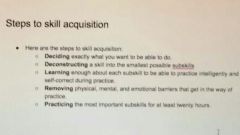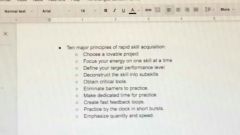![]()
![]()
![]()
Use LEFT and RIGHT arrow keys to navigate between flashcards;
Use UP and DOWN arrow keys to flip the card;
H to show hint;
A reads text to speech;
61 Cards in this Set
- Front
- Back
|
When does memory begins to taper off? |
It improves the first few days without any further study, but begins to taper off after day 4 or so |
|
|
What helps when you target you performance level when you want to acquire a skill? |
The more relaxed the targeted performance level, the more rapidly you can acquire the associated skill |
|
|
What does maatery requires? |
Both the possession of ready knowledge and the conceptual understanding of how to use it |
|
|
What's the best philosophy ro have when you decide to learn something completly new? |
You're not competing against other people, you're competing against your own previous lack of ability, and any improvement is a win |
|
|
When is learning deeper and more durable? |
When it's effortful |
|
|
What are the two most significant sources of distraction? |
Electronic and biological |
|
|
Mental models |
Most basic unit of learning, a way of understanding and labeling an object or relationship that exists in the world |
|
|
When is learning stronger? |
When it matters, when the abstract is made concrete and personal |
|
|
What's the relation between learning and time? |
Learning is not really about the raw hours you put in, it's what you put in those hours |
|
|
Is relying on willpower a good strategy? |
Relying on willpower to consistently overcome barriers is a losing strategy |
|
|
What's the best hanit a learner can instill? |
Regular self-quizzing to recalibrate his understanding of what he does and does not know |
|
|
What's the relation between memory and environment? |
Memory function best when your brain is in the same state during study as during testing |
|
|
Does cramming work? |
Cramming works fine in a pinch. It just doesn't last. Spacing does |
|
|
What should you do before jumping in a new practice? |
Doing a bit of research |
|
|
How do you develop mastery? |
Gradual accretion of knowledge, conceptual understanding judgment and skill |
|
|
What are the two strengths of the memory? |
Storage strengrh Retrieval strength |
|
|
A problem well stated ... |
Is a problem half solved |
|
|
What's another way of doing spacing retrieval practice? |
Be interleaving the study of two or more topics, so that alternating between them requires that you continually refresh your mind on each topic as you return to it |
|
|
What should you do in term of your environment when you study? |
Vary your environment, study in diffe rent spots |
|
|
What are the different steps to skill acquisition? |

|
|
|
What are the ten major steps of rapid skill acquisition? |

|
|
|
What are the 3 major techniques for great learning? |
Interleave practice Quizz and practice over study Mix the subjects |
|
|
What to do with good answer with flashcards? |
Don't stop quizzing on those cards, continue to shuffle them into the deck until they're well mastered |
|
|
What to do with outlines? |
Put the notes aside and create an entirely new outline, reorganizing the material. It forces you to think about the material again, and in a different way |
|
|
What should you do when you read? |
Anticipate test questions and their answers as you read |
|
|
What to do for interleave practice? |
Use spaced repetition and reinforcement for memorization, like flashcards |
|
|
What is the relation between forgetting and learning? |
Forgetting is a friend of learning |
|
|
What's the best time to study? |
People who study in the morning do about 30 percent better |
|
|
What's the optimal learning cycle? |
About 90 minutes of focused concentration |
|
|
Sleep and spacing effect? |
Sleep emplifies the spacing effect. Sleep seems to play a large role in memory consolidation, so practice with at least a day in between sessions |
|
|
What does spaced retrieval practice does? |
When you allow some forgetti g to occur between tests, it leads to stronger long-term retention than when its massed |
|
|
What advantage has forgetting a topic? |
The more you forget a topic, the more effective relearning will be in shaping your permanent knowledge |
|
|
Retrieval strength |
Measure of how easily a nugget of information comes to mind. It increases with studying, and with use |
|
|
How should you set intervals? |
Should be as long as possible to obtain the minimum frequency of reperitions, and to make the best use of the so called spacing effecy. Intervals should be short enough to ensure that the knowledge is still remembered |
|
|
When can yiu really say you know a topic? |
Until you have to teach it, until you have to make it clear to someone else |
|
|
Relation between feedback and skill? |
The more sources of fast feedback you integrate into your practice, the faster you'll acquire the skill |
|
|
How can practice generation? |
When reading new class material, try explaining beforehand the key ideas you expect to find in the material and how you expect they will relate to your prior knowledge. Then read the material to see if you were correct |
|
|
How to use study fuide when you study? |
Review study guides, find terms you can't recall or don't know and relearn those terms |
|
|
What are the best tests for the learner? |
Tests that require the learner to supply the answer, like an essay or short answer test, or simply practice with flashcards, appear to be more effective than simple recognition tests like multiple choice or tru/false tests |
|
|
Good way to learn important terms |
Copy bolded terms and their definitions into a reading notebook, making sure that you understand them |
|
|
What's beter: testing or studying? |
Testing is way better than studying |
|
|
What should you do in your head during lectures? |
Answer rhetorical questions in your head during lectures to test your retention of the reading |
|
|
What does varied practice do? |
Varied practice produces a slower apparent rate of improvement in each single practice session but a greater accumulation of skill and learning over time |
|
|
Why should you mix the subjects? |
The more you connect what you learn to what you already know, and the more associations you make to a memory, then the more mental cues you have through which to find and retrieve the memory again later |
|
|
Why is varied practice more effective than the focused kind? |
Because it forces us to internalize general rules of motor adjustment that apply to any hittable target |
|
|
What mixing problems during study forces you to do? |
It forces you to identify each type of problem and match it to the appropriate kind of solution |
|
|
What research ahould you do before acquiring a new skill? |
Research the skill and related topics. The goal is to identify at least three books, DVDs, courses, or other resources that appear to be connected to the skill you're try I ng to acquire |
|
|
When should you start practicing? |
Should start as quickly as possible, not thinking about practicing but actually practicing |
|
|
What device should you use? |
Capture devices, like video cameras, that can help you watch yourself as you perform |
|
|
What about tools? |
Obtain the very best tools you can find and afford |
|
|
What about confusion? |
Jump in over your head, move toward the confusion |
|
|
Why should you do an early research? |
To identify the most important subskills, critical components, and required tools for practice as wuickly as possible |
|
|
On what subskills should you focus? |
On those that promises the most dramatic overall returns |
|
|
Why should you focus on only one thing? |
If you only have an hour or two each day to devote to practice and learning, and you spread that time and energy across twenty different skills, no individual skill is going to receive enough time and energy to generate noticeable improvement |
|
|
Where does skill comes from? |
Skill is the result of deliberate, consistent practice, and in early-stage practice, quantity and speed trump absolute quality. The faster and more often you practice, the more rapidly you'll acquire the skill |
|
|
What you practice schedule should be during the day? |
Practice by the clock in short bursts. Set aside time for three to five practice sessions a day, and tou'll see major progress in a very short period |
|
|
Why should you focus on the critical subskills first? |
Because you'll make more progress with less effort |
|
|
How should you set your target performance level? |
The more specific your target performance level is, the better |
|
|
When should you start long projects? |
As soon as you can. Your mind will be writting your project in the back ground, even if you are not eorking on it actively |
|
|
How to attack a large project? |
We should start work on large projects as soon as possible and stop when we get stuck, with the confidence that we are initiating percolation |
|
|
On what should you emphasize with new skills? |
On quantity and speed. Instead of trying to be perfect, focus on practising as much as you can as quickly as you can, while maintaining "good enough" form. |

